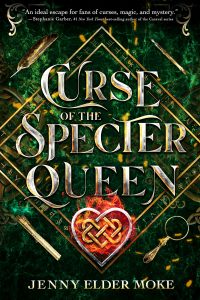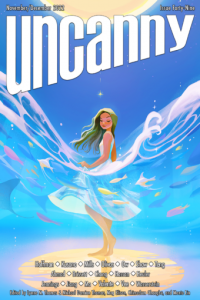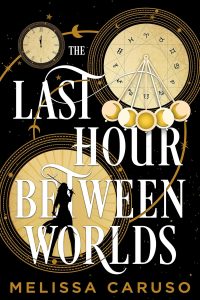Alex Brown Reviews Bloom by Delilah S. Dawson
 Bloom, Delilah S. Dawson (Titan Books 978-1-80336-575-6, $22.99, 208pp, hc) October 2023. Cover by Julia Lloyd.
Bloom, Delilah S. Dawson (Titan Books 978-1-80336-575-6, $22.99, 208pp, hc) October 2023. Cover by Julia Lloyd.
I’ll admit, it’s been a while since I read anything by Delilah S. Dawson. I enjoyed her young adult speculative novels Hit and Servants of the Storm, comic book Ladycastle, her speculative romance stories, and her Weird West series The Shadow written under the pseudonym Lila Bowen. But for no reason in particular, I drifted away from her work. I think we all have those authors whose work we enjoy but haven’t kept up with. When Bloom came out, I thought it was the perfect opportunity to dive back in. Hard to say no to a novella, right?
Ro, an early-career literature academic, moves to a quaint university town. She’s single now, and is looking to break free from her unpleasant relationship with her demanding mother. With all that freedom comes profound loneliness. In an attempt to get out and enjoy life a bit, she hits the local farmers’ market. There she encounters Ash, a manic pixie dream girl straight out of a boho influencer TikTok. She’s ethereal and enigmatic, a fairy selling sweet treats at a magical market or an untouchable beauty with quirky interests. But beneath all that beauty, rot has set in. Ash and Ro start, well, I hesitate to call it ‘‘dating,’’ but it involves dinner and a lot of sex. The more time they spend together, the harder Ro finds it to extricate herself. She lets Ash consume her, metaphorically and not so metaphorically, until Ro loses herself completely.
The snappiest way I can think of to describe Bloom is as a sapphic, cottagecore Hannibal. It’s delightfully queer, viciously cruel, creatively cannibalistic, and distressingly passionate. It is a novella that revels in making the reader increas ingly uncomfortable. You’ll want to put it down, but you won’t be able to.
Everything in this story is toxic, from the relationship to Ro’s own sense of self. She drags around internalized fatphobia like a steamer trunk and constantly body-shames herself for not being what she has decided (and society has impressed upon her) is the ideal size and shape. Ro excuses every red flag because she’s had enough bad relationships with men that she thinks red flags are just a normal part of a relationship. She believes she doesn’t deserve anything better, that she should be grateful anyone as attractive as Ash is interested in her, and that any problems have to be on her end rather than Ash’s. Even when Ash dismisses her, threatens her, gaslights her, and physically and verbally abuses her, Ro takes it in stride, convincing herself that all is well.
What Dawson does well is ease the reader into Ash the same way she does Ro. At first, Ash seems too perfect to be real. If she ever got around to seeing a therapist, Ro would discover she’s pretty interesting herself, but toxic relationships with partners and parents have worn her self-esteem down into a pit as deep as the Grand Canyon. In other words, she’s ripe pickings for an abuser, and Ash is ready to pluck her.
Ash glides into Ro’s life and lures her in with seductive looks and personalized cupcakes. She lets her into the fantasy version of her life and snookers her with honeyed words. She is everything Ro wants to be and wants to be with. While the reader knows this is a horror romance, Ro sees only the romance side. And like a good horror story, she doesn’t recognize the terror until it’s too late. When Ash kisses, she casts a love spell, and when she bites, she draws blood.
Bloom is very enjoyable, but I wish it went one step further. The ending is perfectly cruel, but I’m not convinced it has a point. Maybe the point is no point, but I think the story needed to lean into the social consequences more. Overall, however, it’s short, scary, sapphic, and so, so, so good. I’m glad I decided to jump back into Delilah S. Dawson’s writing. Now I want to go back and read what I missed.
Alex Brown is a librarian, author, historian, and Hugo-nominated and Ignyte award-winning critic who writes about speculative fiction, young adult fiction, librarianship, and Black history.
This review and more like it in the December and January 2023 issue of Locus.
 While you are here, please take a moment to support Locus with a one-time or recurring donation. We rely on reader donations to keep the magazine and site going, and would like to keep the site paywall free, but WE NEED YOUR FINANCIAL SUPPORT to continue quality coverage of the science fiction and fantasy field.
While you are here, please take a moment to support Locus with a one-time or recurring donation. We rely on reader donations to keep the magazine and site going, and would like to keep the site paywall free, but WE NEED YOUR FINANCIAL SUPPORT to continue quality coverage of the science fiction and fantasy field.
©Locus Magazine. Copyrighted material may not be republished without permission of LSFF.







